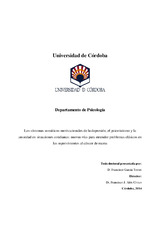Mostrar el registro sencillo del ítem
Los síntomas somáticos-motivacionales de la depresión, el psicoticismo y la ansiedad en situaciones cotidianas: nuevas vías para entender problemas clásicos en las supervivientes al cáncer de mama.
| dc.contributor.advisor | Alós Cívico, Francisco | |
| dc.contributor.author | García Torres, Francisco | |
| dc.date.accessioned | 2014-09-17T09:07:58Z | |
| dc.date.available | 2014-09-17T09:07:58Z | |
| dc.date.issued | 2014 | |
| dc.identifier.uri | http://hdl.handle.net/10396/12322 | |
| dc.description.abstract | Objective To determine if the prevalence of depressive symptoms, higher levels of psychoticism and specific situational traits is higher in breast cancer survivors groups than control groups. Method Twenty-two mastectomised women and twenty-five breast cancer survivors who had finished treatment were compared with two control groups. Two categories of depressive symptoms (cognitive-affective and motivational-somatic) were assessed using the Beck Depression Inventory (BDI-II); psychoticism was assessed using the Eysenck Personality Questionnaire-Revised (EPQ-R). Three anxiety systems (cognitive, physiological and motor) and four situational anxiety traits (anxiety about the evaluation, interpersonal anxiety, phobic anxiety and anxiety in situations common in everyday life) were also assessed. Data on age, marital status, education and employment status were collected. Results The mean age of the groups were as follows, mastectomised women: 59.13 years (SD = 7.83), control group: 55.86 years (SD = 11.56), survivor group 58.64 years (SD = 8.01), second control group 54.40 years (SD = 12.36). There were no differences between mastectomised women and the control group in socio-demographic variables, but most of the survivor group were retired whereas most of the second control group were unemployed. The mastectomised group and the survivor group had significantly higher levels of both categories of depressive symptoms (cognitive-affective and motivational-somatic) than the control groups,levels of motivational-somatic symptoms were higher. Trait anxiety and psychoticism were correlated and also predicted the level of depressive symptoms; higher levels of psychoticism were observed in the survivor group. The survivor group also showed more anxiety in common situations of everyday life than the second control group. | es_ES |
| dc.format.mimetype | application/pdf | es_ES |
| dc.language.iso | spa | es_ES |
| dc.publisher | Universidad de Córdoba, Servicio de Publicaciones | es_ES |
| dc.rights | https://creativecommons.org/licenses/by-nc-nd/4.0/ | es_ES |
| dc.subject | Cancer | es_ES |
| dc.subject | Oncology | es_ES |
| dc.subject | Breast cancer | es_ES |
| dc.subject | Survivors | es_ES |
| dc.subject | Motivational-somatic | es_ES |
| dc.subject | Psychoticism | es_ES |
| dc.subject | Everyday life anxiety | es_ES |
| dc.subject | Oncología | es_ES |
| dc.subject | Cáncer de mama | es_ES |
| dc.subject | Supervivientes | es_ES |
| dc.subject | Motivación somática | es_ES |
| dc.subject | Ansiedad | es_ES |
| dc.title | Los síntomas somáticos-motivacionales de la depresión, el psicoticismo y la ansiedad en situaciones cotidianas: nuevas vías para entender problemas clásicos en las supervivientes al cáncer de mama. | es_ES |
| dc.type | info:eu-repo/semantics/doctoralThesis | es_ES |
| dc.rights.accessRights | info:eu-repo/semantics/openAccess | es_ES |

